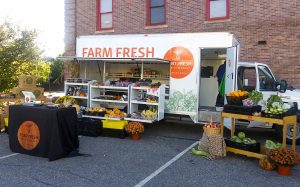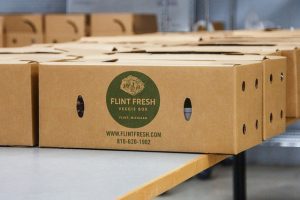
The Flint water crisis was also, in effect, a food crisis. For families impacted by contaminated drinking water, proper nutrition can help mitigate the long-term dangers of lead poisoning. But food security was a longstanding public health challenge even before the water crisis. As the city began recovering, Flint residents and organizations faced a daunting task: to combat the effects of lead by reversing a decades-long food access challenge.
Flint Fresh is one of numerous organizations born out of this need. Their various programs, including a mobile market, a produce delivery system, and a new Food Hub building, signify a renewed investment in Flint’s future. Their fundamental goal—to increase access to healthy food for Flint residents—is deceptively simple. It’s also timely: food-as-medicine efforts are gaining steam across Michigan and the country.

A farmer’s market on wheels
The Flint Fresh Mobile Market was the organization’s original nutrition program, started in 2016 with a practical function at its core: healthy food helps limit lead absorption. The first mobile market was a single recommissioned MTA bus, its new passengers not people, but locally sourced fruits and veggies.
But Flint Fresh had goals beyond reacting—they saw the potential for a deeper impact on the community’s food economy. Other partners, including the Health Fund, agreed. The program has grown immensely: today, there are three Flint Fresh-branded trucks on the roads, bringing fresh produce to senior living centers, apartments, and schools around Flint.
The Mobile Market is out transporting fresh food around Flint nearly every day, these frigid February days included. In fact, the need might be most acute in winter weather, when icy roads, inadequate transit, and the threat of frostbite are all good reasons not to go to the store.
Need even more convenience? Order delivery
While the Mobile Market sets up shop at central locations and public spaces, the Flint Fresh food box subscription program brings fruits and vegetables directly to Flint doorsteps. Residents and businesses within city limits can receive boxes with no delivery fee, or they can choose to pick up their orders directly from the Food Hub. Flint Fresh’s seven employees gather food from various regional growers and farmers, securing the volume necessary for bulk sales to larger corporations as well as hundreds of individually-sold veggie boxes.
Like the Mobile Market, the subscription program started small and expanded quickly. They sold 30 boxes in their first month, and they are now up to nearly 300 boxes per month. But to the employees, even more satisfying than the numbers are the personal accounts of the program’s benefits.
“We’ve had some people write us and say this is the only source of fruits and vegetables they get,” said Flint Fresh executive director Cheryl McHallam. “It’s very heartfelt when you hear responses like that.”


The price is right
Flint Fresh knows that if they want people to buy these locally sourced foods, selling for a profit—or even to break even—is not an option at this point. They sell at cost (veggie boxes range from $15-30) and rely largely on grant dollars to keep their business running. As they increase capacity and find more wholesale clients, they’re inching closer to self-sufficiency. But for now, they’re focused on getting nutrition to those who need it most—regardless of location or price.
To that end, government and foundation support has been helpful. On top of the already economical pricing of their products, Flint Fresh veggie boxes and Mobile Market products are eligible for purchase using a Michigan Bridge (food assistance) card, as well as the Health Fund-supported Double Up Food Bucks program. Double Up Food Bucks allows residents who receive food assistance to purchase double the fruits and vegetables on their dollar, encouraging people to eat healthy and buy local.
The Flint Fresh food is also eligible for pediatric nutrition prescriptions, a relatively new approach in which doctors prescribe fresh produce for families the same way they would prescribe an antibiotic for an ear infection. Flint is among the first areas in the nation to incorporate this type of prescription program, which has been a focus for the Health Fund, but they’re not alone. Prescription for nutrition programs are going nationwide: the 2018 U.S. Farm Bill included $20 million in funding to expand their implementation.
What’s next
As Flint Fresh continues to expand its programs, leaders of the organization are starting to examine other parts of the healthy eating equation. They know people can’t make healthy decisions until they understand what’s healthy, where to get it and how to prepare it, and just how valuable it can be for their families.
As a start, the nonprofit has invested in the Educare Flint school, which, in addition to providing schooling for children under five years old, provides trainings and resources for adults in the wider Flint community. Flint Fresh is helping make sure nutrition is part of Educare’s programming, both for children and adults.
“When people understand what they’re using, what they’re purchasing, they make different choices,” said Flint Fresh Food Hub board member and Community Foundation of Greater Flint staff member Artina Sadler. She says the organization intends to broaden their education work in the near future.
Ultimately, Flint Fresh is striving to make nutrition a deep and universal priority in their city, so that the children of the water crisis can grow up in a fundamentally different Flint. This shift is related to culture, to systems, and to policy—it won’t happen overnight. And Flint Fresh, along with their peers working in the nutrition space, understand that food security is both separate from and related to other ongoing transitions, like an uptick in economic development.
Across the challenges and opportunities, Flint Fresh wants their city to become a model of modern nutrition, and based on some promising results, they are well on their way.

